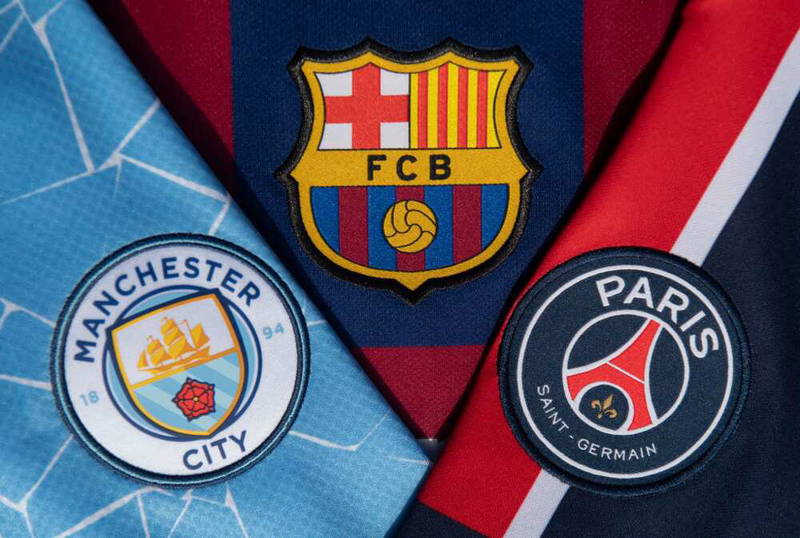Breaking
The World’s 10 Wealthiest Football Clubs

Football clubs around the world have long been symbols of not just athletic prowess but also significant financial might. As the sport continues to grow in popularity and financial stakes, certain clubs have amassed considerable wealth.
Here’s a detailed examination of the world’s ten wealthiest football clubs, highlighting their revenue sources, financial strategies, and impacts on the global football landscape.
1. FC Barcelona
FC Barcelona, based in Catalonia, Spain, stands as one of the richest football clubs globally. Known for its unique playing style and illustrious history, the club generates substantial revenue from various streams. Ticket sales at their iconic Camp Nou stadium contribute significantly to their income, as does merchandise and licensing deals. Additionally, FC Barcelona’s strong commercial partnerships and high-value sponsorship agreements, including a notable deal with Nike, bolster their financial status. Their recent ventures into digital platforms and global tours have further enhanced their revenue.
2. Real Madrid CF
Real Madrid, another Spanish powerhouse, has consistently been at the top of the wealthiest football clubs list. Their financial success can be attributed to their vast global fanbase, which drives substantial revenue from merchandise and matchday sales. The club’s strategic investments in high-profile players, along with lucrative sponsorship deals and partnerships, including their long-term agreement with Adidas, play a crucial role in maintaining their financial dominance. Real Madrid’s recent expansion into international markets and digital media has further amplified their revenue streams.
3. Manchester United FC
Manchester United, one of the most recognizable football brands globally, enjoys substantial wealth from multiple revenue streams. The club benefits from a massive global fanbase, driving significant income from merchandise, sponsorships, and commercial partnerships. Their deals with global brands like Chevrolet and Adidas add to their financial strength. The club’s historic success and its ongoing presence in the English Premier League, along with its extensive global marketing efforts, solidify its position among the wealthiest football clubs.
4. Bayern Munich
Bayern Munich, the most successful club in German football history, also ranks among the wealthiest. The club’s revenue is driven by a combination of factors including matchday sales at the Allianz Arena, merchandising, and high-value sponsorship deals. Bayern Munich’s strategic partnerships with global brands and their success in domestic and international competitions contribute to their robust financial health. The club’s focus on developing talent through their academy and maintaining financial prudence ensures long-term stability.
5. Paris Saint-Germain (PSG)
Paris Saint-Germain, the French club with a growing global profile, has achieved significant financial success in recent years. Backed by substantial investment from Qatar Sports Investments, PSG has become a major player in both French and European football. Their revenue streams include high-profile sponsorship deals, lucrative television rights, and substantial matchday income. The club’s investments in star players and global marketing initiatives enhance their financial standing and global presence.
READ ALSO:RCCG Appoints Kayode Pitan as Senior Pastor of City of David Amidst Iluyomade Saga
6. Liverpool FC
Liverpool FC, a storied club from England’s Premier League, has seen its financial status rise significantly in recent years. Revenue sources for Liverpool include strong commercial partnerships, matchday income from Anfield, and a growing global fanbase. Their success in domestic and European competitions, combined with significant sponsorship deals, including their partnership with Standard Chartered, contributes to their financial strength. The club’s focus on commercial growth and investment in infrastructure helps maintain its place among the wealthiest.
7. Juventus FC
Juventus, Italy’s premier football club, boasts substantial financial resources driven by a combination of factors. The club benefits from strong matchday revenue at the Allianz Stadium, lucrative sponsorship deals, and substantial merchandise sales. Juventus’s financial strength is further supported by their competitive success in Serie A and European competitions. Their strategic investments in player acquisitions and global marketing initiatives have bolstered their financial position.
8. Chelsea FC
Chelsea FC, based in London, is a prominent player in English football with significant financial resources. The club’s revenue is driven by a variety of sources including matchday income, high-value sponsorship deals, and a strong global merchandise market. Chelsea’s success in domestic and European competitions, combined with their commercial partnerships and significant investments in player talent, ensures their place among the wealthiest football clubs.
9. Arsenal FC
Arsenal FC, another top English club, has substantial financial resources bolstered by various revenue streams. Matchday income from the Emirates Stadium, lucrative sponsorship deals, and global merchandise sales contribute to their financial health. Arsenal’s consistent performance in domestic and European competitions, combined with their commercial strategy, helps maintain their financial standing. The club’s focus on global expansion and brand development plays a key role in their wealth.
10. Tottenham Hotspur FC
Tottenham Hotspur, an English Premier League club, has seen a rise in financial status thanks to several key factors. The club’s revenue is significantly enhanced by their state-of-the-art Tottenham Hotspur Stadium, which drives substantial matchday income. Additionally, lucrative sponsorship deals and global merchandising contribute to their financial success. Tottenham’s competitive performance and strategic investments in infrastructure and player talent support their growing financial strength.
Also,
The financial landscape of football clubs reflects their strategic investments, global reach, and competitive success. Clubs like FC Barcelona and Real Madrid have long dominated the wealth charts due to their rich histories and extensive fanbases.
Meanwhile, clubs such as Paris Saint-Germain and Tottenham Hotspur illustrate how recent investments and strategic planning can significantly impact financial standing. The continued evolution of the football industry, with its increasing emphasis on global markets and digital engagement, suggests that these financial rankings could shift as clubs adapt and grow.
Understanding the financial dynamics of these top football clubs provides insight into the broader economic trends of the sport and highlights the interplay between success on the pitch and financial prosperity. As football continues to evolve, these clubs’ strategies will likely influence the future landscape of the sport’s financial elite.
This overview captures the financial landscape and strategic elements contributing to the wealth of the top football clubs.
















